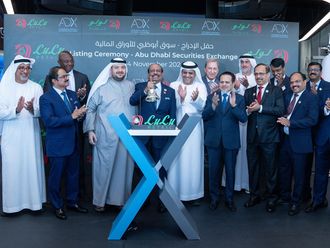
Dubai: Starting June 1, the UAE, its businesses and entrepreneurs will be stepping into a brand new space – of a uniform 9 per cent corporate tax.
Even then, the tax regime will come at ‘zero-rated’ for many businesses, while offering tax ‘relief’ for small businesses. Or, as the Ministry of Finance confirmed today (May 31), for those businesses opting for ‘restructuring relief’.
Over the last month, the Ministry and the Federal Tax Authority have been providing updates and guidelines on what businesses must do while they register - and starting June 1 - come under the tax net.
"The UAE now has the lowest rate among the 182 countries utilizing corporate tax systems globally," said Wassim Chahine – Partner, Head of Corporate Tax at KPMG operations here.

These measures showcase the UAE's proactive approach to modernizing its tax framework, fostering transparency, and adhering to international standards such as tax transparency and International Financial Reporting Standards.
The bottom-line for businesses? Those making more than Dh375,000 a year (or during the taxable period) will be taxed at 9 per cent. That still makes it among the lower rates on corporate tax in the world, and reinforce the UAE’s credentials as offering a lower cost of operation and accompanying tax regime. (Its Gulf peers, Saudi Arabia and Kuwait, have corporate tax rates that are at 20 and 15 per cent, respectively.)
At all points, what the UAE has made it clear is that this is not a tax on personal income, while investments in real estate, stocks and on dividends too are exempt.
Read More
- UAE corporate tax registration ticks along, Dubai’s Net Zero plan, and Everton needs reinforcement, Gulf News Editors comment on the top stories on May 29
- UAE Corporate Tax: Businesses with extensive property assets get a good ‘break’
- UAE Corporate Tax: How will a free zone branch of mainland company be treated?
Why have a corporate tax?
The UAE with the rollout of the tax is seeking two sets of results, according to the Ministry of Finance:
- A competitive corporate tax regime based on international best practices is expected to cement the UAE’s position as a leading global hub for business and investment. And accelerate the UAE’s development and transformation to achieve its strategic objectives.
- A corporate tax regime also reaffirms the UAE’s commitment to meeting international standards for tax transparency and preventing harmful tax practices.

Incidentally, the UAE has had a corporate tax in place in select sectors, such as the local operations of global banks, and on such entities in the energy sector.
For all other business, “The Ministry of Finance has been providing directions to entities in the weeks leading up to June 1 to make the transition smoother,” said Bal Krishen, Chairman and CEO of Century Financial.

This entailed setting up a digital tax services platform - EmaraTax - that allowed private and public joint stock companies to register starting May 15. An AI-powered platform called ‘TaxGPT’ chatbot received thousands of queries from users. These facilities has encouraged proactive participation - and healthy adoption rates.”
Registering for Corporate Tax
Just about every business or those engaging in a business activity should be registering for tax purposes. There are notable exceptions, in the form of entities involved in the extraction of natural resources, public enterprises, and those involved in charity/humanitarian activity.
As for the rest, “The announcements to date indicate that each ‘taxable person’ should obtain individual registrations at the outset,” said Raju Menon, Chairman and Group Managing Partner at Kreston Menon, the consultancy.
“Then, ‘qualifying group’ of entities would apply to form a ‘Tax Group’ at a later date.

On May 14, the FTA announced would be open for ‘public joint stock companies’ and for private companies starting May 15. Currently, the FTA has not announced general registrations for free zone persons and branches of foreign companies/non-residents.
Registration is free of charge
For companies signing up for corporate tax compliance, the registration comes free. The tax authorities have named ‘tax agents’ to help speed up the process for businesses, or to give insights into the various provisions that cover the scope of their activity.
But make sure to be quite clear what details are being place into the system – and how. Once done, it will be difficult to ‘claw’ it back.
Of particular importance would be the assets – such as property, stocks, etc., - that businesses hold on their books. Two options have bene given by the Ministry in how these are entered the first time.
“Generally, carrying costs (as per IAS-16 and IAS-38) would be used for recognising tangible and intangible assets,” said Siddharth Kohli, CEO of Indigenesis Business Consulting. “Businesses have can choose from two different methods to revalue the assets if required. The gain arising on such revaluation, if any, would not be liable to corporate tax.

Businesses can choose from two different methods to revalue the assets if required. The gain arising on such revaluation, if any, would not be liable to corporate tax. Also, it appears that there is no restriction to choose a different method for every asset.

Tax on individuals doing business
Single-person businesses or freelancers whose annual turnover from conducting a business activity and generating more than Dh1 million come under corporate tax.
What they should also keep in mind is income generated from these activities are not taxed:
- Wages (all kinds of salaries, wages, remuneration, benefits, etc.)
- Real estate investment (rent, capital gains, etc.)
- Investment gains (dividends, interest income, etc.)
“But if an individual is engaged in online trading or say imparts some training programs and if the turnover of such individual in a year exceed Dh1 million, then such individuals will be subject to the tax,” said Atik Munshi, Managing Partner at Finexpertiza UAE.
As per the Ministry of Finance, self-employed persons would be subject ‘if their activity is a taxable business or business activity as per the Cabinet Decision’.
Even if the self-employed person is considered to be undertaking a taxable business or business activity, no tax would be payable on the first Dh375,000 of net income earned from the activity.
Plus, there is the Small Business Relief that may be available to the self-employed person and other individual entrepreneurs. If the revenue from such activity comes to under Dh3 million, then they are eligible for the relief.
And, what of free zone businesses?
That’s one of the major pieces of the corporate tax jigsaw that will be unveiled shortly. Basically, free zone based businesses will be rated at 0 per cent on their corporate tax – but for those that maintain extensive operations on the mainland, there are aspects that will need to be honoured.
To be rated at 0 per cent, the business must be treated as a “qualifying free zone person”. For that the entity must:
- Maintain adequate substance in the UAE;
- Derive ‘qualifying Income’ as specified in a Cabinet Decision;
- Comply with transfer pricing rules and maintain the relevant transfer pricing documentation; and
- Not have made an election to be subject to corporate tax in full.

Free zone companies are diagnosing the impact of corporate tax on their operations. It would be advisable to restructure their model of business to better align with the laws and avail the best benefits.
“We emphasize to our clients that they should maintain appropriate documents, specifically when they deal with related parties (RP), as these transactions are subject to ‘transfer pricing’ principles. Benchmarking with industry norms would be essential here.”
A lot of the processes would get easier for businesses in the UAE starting June 1. And after.












